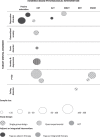Integration of hatha yoga and evidence-based psychological treatments for common mental disorders: An evidence map
- PMID: 35315071
- PMCID: PMC9546402
- DOI: 10.1002/jclp.23338
Integration of hatha yoga and evidence-based psychological treatments for common mental disorders: An evidence map
Abstract
Background: Interest in the use of yoga to enhance engagement with and augment the benefits of psychological treatment has grown. However, a systematic approach to reviewing existing research examining the use of yoga with psychological treatment is lacking.
Materials and methods: This mapping review identified and synthesised research trialling yoga as an integrated or adjunct therapy with evidence-based psychological interventions for the treatment of anxiety, depression, PTSD, and eating disorders.
Results: Overall, the review identified ten published and three unpublished studies, representing either single group or small quasi-experimental research designs.
Discussion: Limited but promising findings were shown for yoga with CBT for anxiety and depression, and the integration of yoga within intensive treatment models for PTSD.
Conclusions: Future research is encouraged to focus on controlled trials that enable examination of the component effect of yoga when applied with evidence-based psychological treatment and acceptability and feasibility data to further knowledge regarding a role for yoga in clinical practice.
Keywords: anxiety; complementary therapy; depression; eating disorders; evidence-based psychological treatment; mapping review; posttraumatic stress disorder; yoga.
© 2022 The Authors. Journal of Clinical Psychology published by Wiley Periodicals LLC.
Figures
References
-
- Australian Institute of Health and Welfare (AIHW) . (2018). Australia's health 2018. Australia's health series no. 16. https://www.aihw.gov.au/getmedia/7c42913d-295f-4bc9-9c24-4e44eff4a04a/ai...
-
- Australian Psychological Society (APS) . (2018). Evidence‐based psychological interventions in the treatment of mental disorders: A review of the literature. Australian Psychological Society.
Publication types
MeSH terms
LinkOut - more resources
Full Text Sources
Medical



